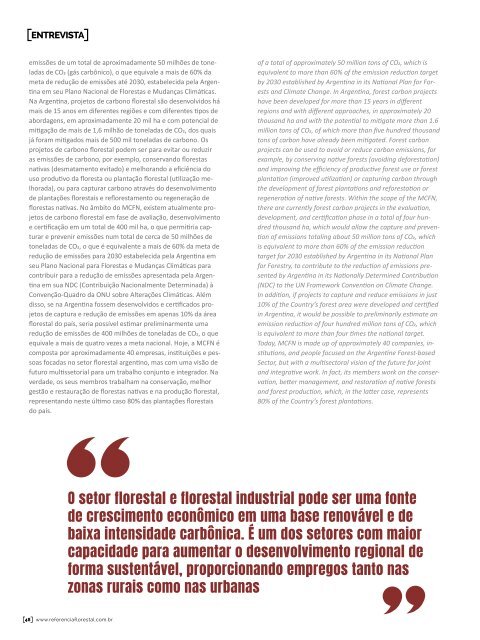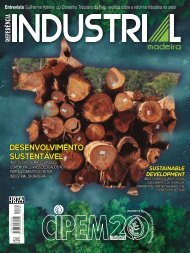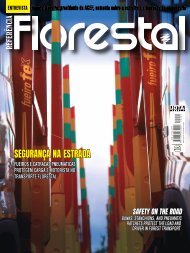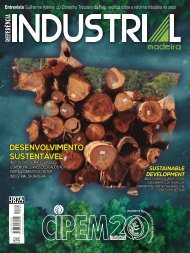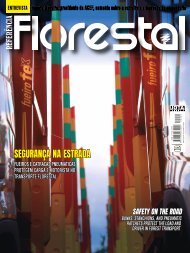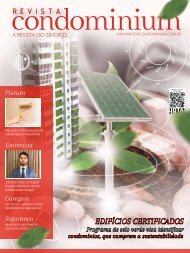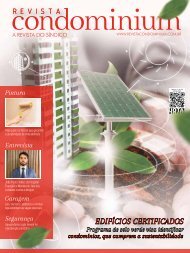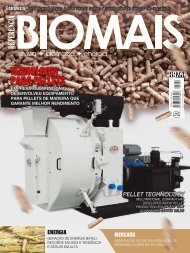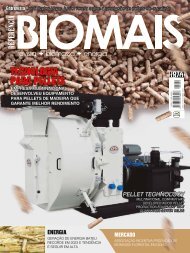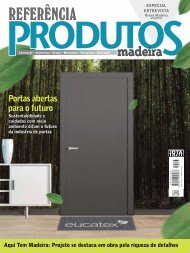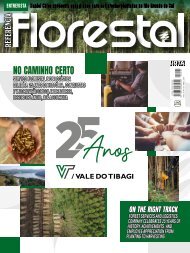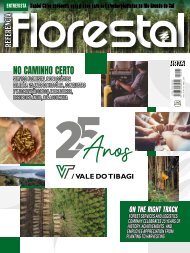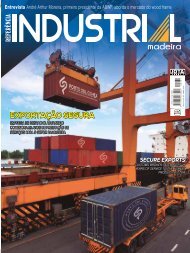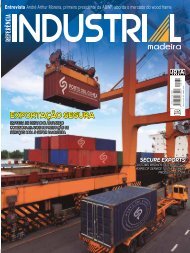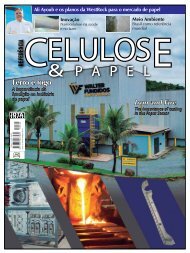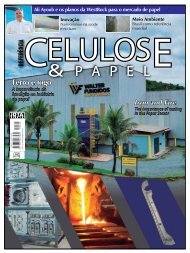Florestal_260Web
Create successful ePaper yourself
Turn your PDF publications into a flip-book with our unique Google optimized e-Paper software.
ENTREVISTA<br />
emissões de um total de aproximadamente 50 milhões de toneladas<br />
de CO2 (gás carbônico), o que equivale a mais de 60% da<br />
meta de redução de emissões até 2030, estabelecida pela Argentina<br />
em seu Plano Nacional de Florestas e Mudanças Climáticas.<br />
Na Argentina, projetos de carbono florestal são desenvolvidos há<br />
mais de 15 anos em diferentes regiões e com diferentes tipos de<br />
abordagens, em aproximadamente 20 mil ha e com potencial de<br />
mitigação de mais de 1,6 milhão de toneladas de CO2, dos quais<br />
já foram mitigados mais de 500 mil toneladas de carbono. Os<br />
projetos de carbono florestal podem ser para evitar ou reduzir<br />
as emissões de carbono, por exemplo, conservando florestas<br />
nativas (desmatamento evitado) e melhorando a eficiência do<br />
uso produtivo da floresta ou plantação florestal (utilização melhorada),<br />
ou para capturar carbono através do desenvolvimento<br />
de plantações florestais e reflorestamento ou regeneração de<br />
florestas nativas. No âmbito do MCFN, existem atualmente projetos<br />
de carbono florestal em fase de avaliação, desenvolvimento<br />
e certificação em um total de 400 mil ha, o que permitiria capturar<br />
e prevenir emissões num total de cerca de 50 milhões de<br />
toneladas de CO2, o que é equivalente a mais de 60% da meta de<br />
redução de emissões para 2030 estabelecida pela Argentina em<br />
seu Plano Nacional para Florestas e Mudanças Climáticas para<br />
contribuir para a redução de emissões apresentada pela Argentina<br />
em sua NDC (Contribuição Nacionalmente Determinada) à<br />
Convenção-Quadro da ONU sobre Alterações Climáticas. Além<br />
disso, se na Argentina fossem desenvolvidos e certificados projetos<br />
de captura e redução de emissões em apenas 10% da área<br />
florestal do país, seria possível estimar preliminarmente uma<br />
redução de emissões de 400 milhões de toneladas de CO2, o que<br />
equivale a mais de quatro vezes a meta nacional. Hoje, a MCFN é<br />
composta por aproximadamente 40 empresas, instituições e pessoas<br />
focadas no setor florestal argentino, mas com uma visão de<br />
futuro multissetorial para um trabalho conjunto e integrador. Na<br />
verdade, os seus membros trabalham na conservação, melhor<br />
gestão e restauração de florestas nativas e na produção florestal,<br />
representando neste último caso 80% das plantações florestais<br />
do país.<br />
of a total of approximately 50 million tons of CO2, which is<br />
equivalent to more than 60% of the emission reduction target<br />
by 2030 established by Argentina in its National Plan for Forests<br />
and Climate Change. In Argentina, forest carbon projects<br />
have been developed for more than 15 years in different<br />
regions and with different approaches, in approximately 20<br />
thousand ha and with the potential to mitigate more than 1.6<br />
million tons of CO2, of which more than five hundred thousand<br />
tons of carbon have already been mitigated. Forest carbon<br />
projects can be used to avoid or reduce carbon emissions, for<br />
example, by conserving native forests (avoiding deforestation)<br />
and improving the efficiency of productive forest use or forest<br />
plantation (improved utilization) or capturing carbon through<br />
the development of forest plantations and reforestation or<br />
regeneration of native forests. Within the scope of the MCFN,<br />
there are currently forest carbon projects in the evaluation,<br />
development, and certification phase in a total of four hundred<br />
thousand ha, which would allow the capture and prevention<br />
of emissions totaling about 50 million tons of CO2, which<br />
is equivalent to more than 60% of the emission reduction<br />
target for 2030 established by Argentina in its National Plan<br />
for Forestry, to contribute to the reduction of emissions presented<br />
by Argentina in its Nationally Determined Contribution<br />
(NDC) to the UN Framework Convention on Climate Change.<br />
In addition, if projects to capture and reduce emissions in just<br />
10% of the Country’s forest area were developed and certified<br />
in Argentina, it would be possible to preliminarily estimate an<br />
emission reduction of four hundred million tons of CO2, which<br />
is equivalent to more than four times the national target.<br />
Today, MCFN is made up of approximately 40 companies, institutions,<br />
and people focused on the Argentine Forest-based<br />
Sector, but with a multisectoral vision of the future for joint<br />
and integrative work. In fact, its members work on the conservation,<br />
better management, and restoration of native forests<br />
and forest production, which, in the latter case, represents<br />
80% of the Country’s forest plantations.<br />
O setor florestal e florestal industrial pode ser uma fonte<br />
de crescimento econômico em uma base renovável e de<br />
baixa intensidade carbônica. É um dos setores com maior<br />
capacidade para aumentar o desenvolvimento regional de<br />
forma sustentável, proporcionando empregos tanto nas<br />
zonas rurais como nas urbanas<br />
48 www.referenciaflorestal.com.br


